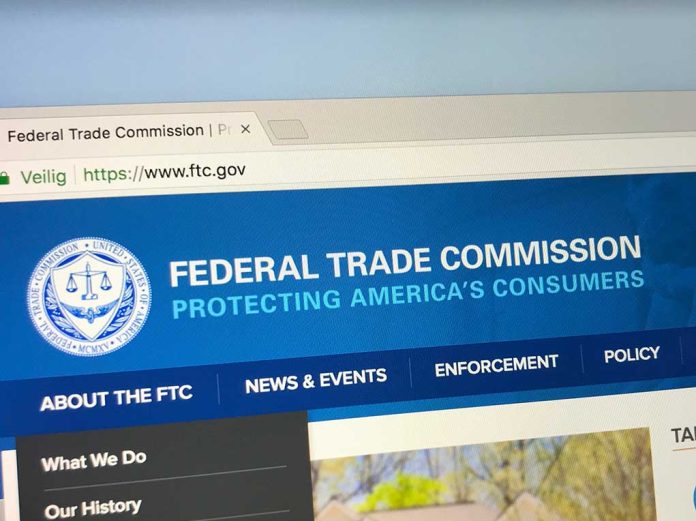
The Federal Trade Commission has launched a major investigation into Media Matters for allegedly orchestrating an illegal advertiser boycott against Elon Musk’s X platform, marking an unprecedented government intervention in the battle between conservative free speech advocates and progressive media watchdogs.
Key Takeaways
- The FTC is investigating Media Matters for potential illegal collusion with advertisers against Elon Musk’s X platform, requesting extensive documentation and communications
- Major brands, including IBM, Apple, and Disney, withdrew from X after Media Matters reported that their ads appeared alongside antisemitic content
- Elon Musk filed a lawsuit against Media Matters, claiming they manipulated algorithms to show racist content next to advertisers’ posts
- The investigation is part of broader actions by the Trump administration against left-leaning organizations
- X has multiple ongoing lawsuits against advertisers and organizations allegedly conspiring to reduce ad spending on the platform
FTC Demands Records in Escalating Investigation
The Federal Trade Commission has intensified its scrutiny of Media Matters for America, launching a formal investigation into allegations that the progressive watchdog group illegally colluded with advertisers to boycott Elon Musk’s X platform. The investigation centers on claims that Media Matters conspired with other organizations to encourage major companies to withdraw advertising support from the social media platform. This probe represents a significant escalation in the ongoing conflict between Musk and Media Matters, which began when the watchdog group published reports about advertiser content appearing alongside controversial posts.
As part of its investigation, the FTC has issued a letter to Media Matters requesting extensive documentation, including budgets, internal communications about the impact of harmful online content on advertisers, and correspondence with other watchdog groups. Of particular interest to investigators are Media Matters’ communications with organizations that assess social media content, notably the Global Alliance for Responsible Media. The civil investigative demand focuses specifically on potential anticompetitive conduct within digital advertising markets.
“The Federal Trade Commission on Wednesday opened an investigation into Media Matters, a liberal advocacy organization that has published research on hateful and antisemitic content on X, according to two people familiar with the inquiry,” stated The New York Times.
Musk’s Legal Counteroffensive Gains Traction
Elon Musk has not been passive in response to what he views as a coordinated attack on his platform. The X owner filed a lawsuit against Media Matters, claiming the organization “completely misrepresented the real user experience” and manipulated the platform’s algorithms to deliberately show “racist, incendiary content” next to advertisements from major companies. Attorneys representing X characterized Media Matters’ actions as “intentionally deceptive,” designed to damage the platform’s reputation and revenue streams by driving away advertisers who feared brand safety concerns.
“Completely misrepresented the real user experience,” said Elon Musk.
Musk’s legal strategy appears to be gaining momentum. A Texas judge has allowed his lawsuit against Media Matters to proceed, while Texas Attorney General Ken Paxton and Missouri Attorney General Andrew Bailey have both opened separate investigations into the organization for potential fraudulent activity and unlawful business practices. These multiple legal fronts represent a coordinated approach to addressing what Musk’s supporters view as inappropriate interference in the free market and targeted harassment of a platform committed to free speech principles.
Broader Implications for Media and Tech Landscape
The FTC investigation is widely seen as part of President Trump’s broader actions against organizations aligned with the political left. Critics of the investigation, including Media Matters president Angelo Carusone, view it as an intimidation tactic rather than a legitimate inquiry into anticompetitive practices. The political dimensions of this case highlight the increasingly partisan nature of regulatory approaches to media and technology companies, with conservatives rallying behind Musk as a champion of free speech against what they perceive as coordinated progressive censorship efforts.
“Angelo Carusone, the president of Media Matters, suggested that the investigation was an effort to intimidate his group.”
The battle has expanded beyond just Media Matters and X. The platform has filed additional lawsuits against the World Federation of Advertisers and several major brands, alleging illegal conspiracy to reduce ad spending. The US House judiciary committee previously accused the Global Alliance for Responsible Media of coordinating an illegal boycott, which led to its shutdown in August. Despite these challenges, advertising spending on X is projected to rise in 2025, though it remains below pre-Musk acquisition levels, suggesting that the platform may be weathering the storm of controversy and finding its footing in a polarized media landscape.
Financial Impact and Ongoing Legal Battles
The financial stakes in this conflict are substantial. When Media Matters published its report showing major brands’ advertisements alongside controversial content, companies including IBM, Apple, Disney, Lionsgate, and Paramount quickly withdrew their advertising from X. This exodus represented a significant revenue hit for the platform, which depends heavily on advertising income. Media Matters has claimed that defending against X’s lawsuits has incurred significant financial costs for the organization, potentially limiting its ability to conduct its regular watchdog activities.
The legal battles continue on multiple fronts, with cases active in both Texas and California. X has accused Media Matters of defamation and market manipulation, while Media Matters has counter-sued for what it characterizes as abusive litigation designed to silence criticism. These parallel legal proceedings will likely determine not just the fate of these specific organizations but potentially set precedents for how digital platforms, advertisers, and watchdog groups interact in the future, with significant implications for online speech, brand safety considerations, and the economic models that support social media platforms.



